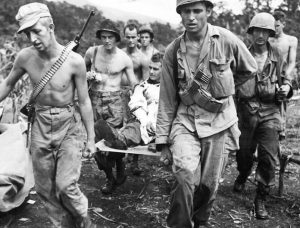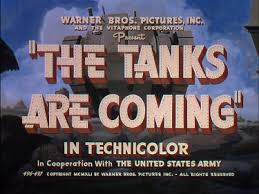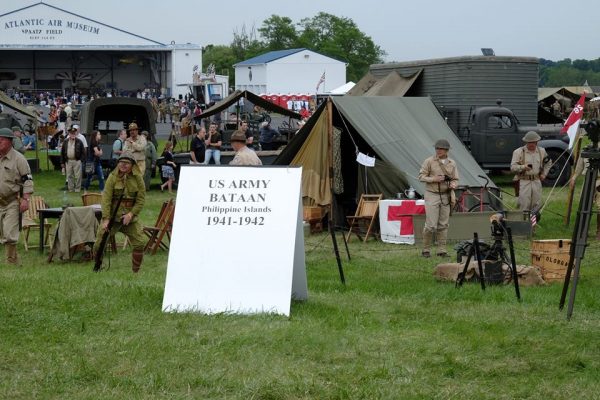Reenacting WWII: Speaking the hard truth seems to have fallen to me
It’s an odd feeling starting to write something that maybe you’re not supposed to write. Maybe people won’t want to hear what you have to say. But that’s the chance a writer takes, and sometimes it’s almost as if he or she has been pushed out on that limb.
As a twelve year veteran of WWII reenacting and raised in a military family, it seems there’s something to say, and it seems to be falling to me to say it. Recent events and trends seems to demand it, but officially no one exists with the responsibility, particularly since there’s nothing really “official” in reenacting.
Most people have at least heard of reenacting, and the majority are most familiar with the Civil War variety, but there’s others, too. Lots of them. In fact you’ll find just about every period of history being reenacted these days, and worldwide. I’ve even recently heard of groups forming to reenact cavemen.
Now, it’s easy to laugh, particularly from the outside, and really, a lot of it is all in good fun in the first place. After all, it’s just an extension of what we did as kids, right? Dress-up or playing army, right? Tons of fun. Why not play as adults, too? I have to say that in my dozen years participating, sometimes attending up to ten events in a season, the adrenaline flows pretty freely. It can be a rush and oodles of fun.
But there’s a problem here, and it’s one many find uncomfortable discussing. It’s a problem that’s particularly relevant when you’re talking about wartime periods in history.
In a nutshell it’s pretty simple . . . people suffered and died, often needlessly, and often in the millions. That very obvious, simple fact is all too easily forgotten.

A reenactor, and even the general public observing them often have a tragic disconnect from these horrible facts. Even you reading this may be saying, “Oh now, there he goes getting depressing. We’re all just having a good time and learning about history.”
Wait a minute.
What exactly are we learning?
All this pontificating of mine is sprouting from a recent series of incidents over a large, long-running WWII event held in winter on an Army base in Pennsylvania that has been terminated. It’s become not just symptomatic of this disconnect I’m speaking of, but iconic, and iconic of both reenactor and public attitudes. It’s becoming reflective of most peoples’ attitudes about war itself as well as the weapons of war. We’ve become simplistic and even adolescent in the way we see it, at least as a culture, and regardless of political philosophy.
As individuals, we may know in our heart-of-hearts that “war is bad.” But with the literal proliferation of violence in the media, and you have to admit we’re pounded by it, we’re becoming desensitized to what it actually means. We’re numbed, even calloused to it.
It the early years, the Civil War being the first popular war to reenact, there was a sense of “honoring” those that fought and died. I know for a fact, having experienced it myself, that the same attitude carried over to WWII reenacting, which began in the late 70’s and early 80’s. At that time, many WWII veterans were still vibrant and active. The war was still very much in their thoughts and people around them knew it.
There were two distinct groups of veterans, one large and silent, one small and only mildly vocal, but the reenactors listened wherever and whenever they could, hungry to know what it was like, really like. After all, they wanted to respect their father’s, grandfather’s, or even mother’s or grandmother’s experience. Reenacting was formed to both learn and teach; learn what the experience was like and pass that experience on to those who don’t know.
“War is bad” was easy. “War is bad” was on your relatives’ faces. It was their memory and it could even be said it was present with them decades later. You knew that just being around them.

Many were appalled at Hollywood depictions, as they were appalled at how we forgot the horrors of war by entering into more after the war itself. Having spoken to many of them myself about these specific aspects, I know their intent was to make the best of things, have a happy life and do their best to honor that life after so many sacrificed to ensure that future. And often, that graphic, violent sacrifice was right before their very eyes.
War is bad.
Any true warrior across cultures going back thousands of years knows beyond question that war is the very last resort. Yes, prepare, but avoid war at all costs.
But is that what we think and feel today? Is that what we do? Has that numbness crept in? Has it been programmed out of us?
Unfortunately, the evidence is in, it’s pretty clear, and whether my fellow reenactors care to agree with me or not, we’ve fallen into far more “playing army” than we have learning and teaching why war is bad.
We DO agree that war is bad, right?
And also unfortunately, you in the general public have become complicit. I’ve seen the change over the years. I’ve given thousands of hours to public presentations, literally sweat raw and, yes, even bled, demonstrating with others just how the actions of war work, how you kill and maim, and even why you do it. The public’s attitude has gone from being impressed and sobered by it, to applause and cheers, particularly when the action is more graphic or grandiose.
Now, two things. First, what gives me the right to be critical, or even judge, but most of all have the nerve to cite these things? And second, who am I to tell reenactors or even you in the general public what to think?
Anyone who has had even the slightest thought of “being called” to do something with their life will know where I’m coming from. You get that gut feeling that there’s just nobody out there but you to do it. In my case, after considerable contemplation, this simply falls to me and no one else. There is no official spokesperson for reenactors, veterans or the reenacting enthusiasts in the general public. There’s no oversight committee, no government agency and no single non-profit entity. It’s a hobby, and supposedly self-regulating at its scattered grassroots.

Next and critically important, we’ve lost the majority of those veterans, both military and civilian, that lived through the experience. We’ve lost those eyes. The ones that showed us pain.
Paradoxically, those eyes were a very good thing. They reminded us to behave ourselves and keep things in perspective.
War is bad. Don’t do that. People die. Some scars never heal, so work to make things work.
So . . . if you’re a reenactor and just want to have fun with your friends, dress up in uniforms and play with guns, stay home. That’s right. Stay home. You have no business portraying anyone that fought or suffered or died. If the first thing you think when you put on that uniform and pick up that gun isn’t “war is bad” stay home. Otherwise, you have one hell of a callus, selfish nerve. Shame on you.
If you’re part of the general public that goes to reenacting events and thinks all that stuff is really cool and you can’t get enough, shame on you, too. Worse than that, you’ve turned whatever brain you have off and have completely ignored what happens . . . what really happens . . . when that gun goes “bang” or that bayonet pierces skin. When that really cool looking plane drops its bombs, they kill, maim and destroy. There’s absolutely nothing “cool” about that.
Ask my girlfriend’s Filipino grandmother that lived though the Japanese occupation. Ask my great uncle that island-hopped in the Pacific getting wounded several times, earning a Silver and two Bronze Stars, never speaking a word of the war afterward. Ask my flight instructor who was an Army medic from North Africa, across Sicily and Northern Italy, back to England then across the European Theater to the end of the war whether war was good or not. He’ll tell you, “Reenact it? Why would you do that? It was horrible, but we did what we had to and went home.”
Ask my father, who to the day he died, couldn’t handle raw chicken after seeing pilots and crew return to his airfield on Okinawa chewed up from battle where he was a weatherman. Ask Marion Gray, second wave of Utah beach, one of only three survivors of his company of 250 men, who sat with my friends and I in a wheelchair for three and a half hours, telling horrible stories of his experiences on that beach after nearly seventy years of silence. His granddaughter whispered in my ear, “Even we’ve never heard these stories.”
You can’t ask them. They’re all gone.
War is sober, serious, and should never be forgotten for the horror it is, in fact and in truth.
Many of the participants in that long-standing event in Pennsylvania forgot. In recent years they “played army” rather than taking it for the serious immersion into the terrors of war it should have been. They became adolescent, self-engrossed and careless.
Here’s my message. It’s a message I’m compelled to share.
If you don’t have every respect for those that fought, suffered or died, which was every single participant in the war, both civilian and military, whether you’re a reenactor or part of the general public, stay the hell home and keep your disrespectful thoughts to yourself. Worship war in front of your television. Worship death with your video games in the privacy of your own home. But stay away from those who know, care and teach that war is bad.

Don Sweet has two twenty year careers of self-employment under his belt. The first involved graphic design, printing, photography and videography, The second has been a canvas and upholstery business since 1999. He has been a World War II reenactor, also known as a “living historian,” for fourteen years, having founded, organized and operated a group consisting of war correspondents, combat photographers and home front civilians attending as many as ten events per year, educating the public on lessons learned from World War II.


Well said. I have done ACW since 1976. A few years back just north of Phoenix I was at a multi period event. I did the Civil War and Span Am Reenactments. When they were doing WWII I declined. They had uniform things but I interviewed my Grandfather about his experience raising my Mother in Groningen, Netherlands. WWII is something my family experienced. I just don’t do it. I don’t know why. My Mother let me have a German Helmet when I was younger. I kept it hidden from her. I lost it somewhere along the way and don’t really care.
My problem is with ACW Reenactors who steal equipment and take little kids behind locked doors. Weirdos abound in Reenacting. It’s sad because the fun is taken out with that crap.